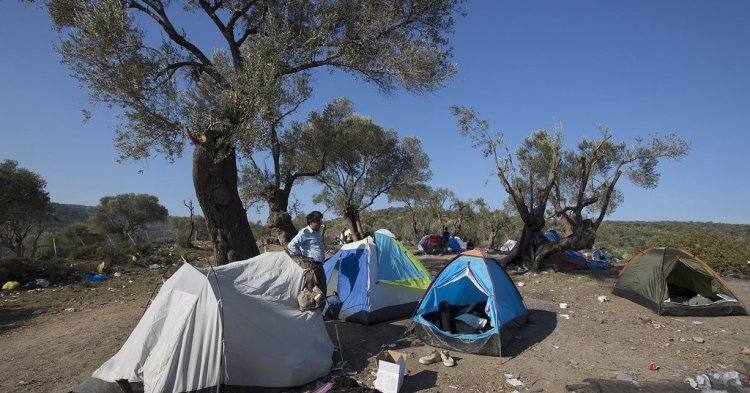Turkey decides to open its borders
In early March 2020, the Turkish government decided to open the country’s borders and break the 2016 deal under which the EU committed to paying €6bn to Turkey in return for stopping asylum seekers and migrants from reaching European soil. Amid accusations of the lack of solidarity demonstrated by the EU, the Turkish President Recep Tayyip Erdogan, decided, after months of threats, to break the deal.
The Turkish instrumentalisation of vulnerable people resulted in about 35,000 migrants, who had previously settled in Turkey, moving to the Turkish-Greek border to try to enter the EU. The Greek police then started pushing these people back over the border by using tear gas, rubber bullets and batons. In addition, on Sunday 1st March, Greece announced the suspension of the processing of asylum applications for one month.
The right to suspend asylum applications?
Greece is a Member State of the European Union and its borders are external borders of the EU, of which human rights and rule of law are founding principles. With its announcement, the Greek government relinquished its responsibilities regarding the protection of these values for one month on European soil. It clearly contradicted Art. 18 of the EU Charter of the Fundamental Rights, where the right to asylum is enshrined. “Neither the 1951 Geneva Convention Relating to the Status of Refugees nor EU refugee law provides any legal basis for the suspension of the reception of asylum applications”, stated the UN Refugee Agency.
Is there really a common EU policy on asylum?
Whereas it is true that the EU has the Dublin system to determine which State is responsible for examining an asylum application, this cannot be considered a common policy on asylum and migration. Within the current system - Dublin III Regulation - the EU principle of solidarity is not really present. The Regulation states that asylum requests must be lodged in their countries of first arrival – which has left border countries with the responsibility of processing thousands of people as well as housing them during the process.
This leads us to question why other more effective solutions have not been adopted. In 2015, former European Commission President Jean-Claude Juncker proposed the introduction of migrant relocation quotas for each EU country. In his State of the Union speech of that year, Mr Juncker said “that common asylum standards are important, but not enough to cope with the current refugee crisis”. We needed more Union, more European Union, he said. We needed more European integration.
Despite the fact that the scheme, which aimed to relocate 160,000 refugees and migrants, was approved by the European Council, it was never fully implemented. When the scheme closed, only 34,712 people had been relocated, of which 21,999 had arrived in Greece and 12,713 in Italy.
Hungary, Poland and the Czech Republic fiercely opposed it, and the European Commission launched infringement procedures against the three Member States in June 2017. However, it was only very recently that the European Court of Justice confirmed that these Member States “had failed to fulfil their obligations under EU law” when refusing to admit refugees and asylum seekers.
EU-Turkey Statement: a pact of shame
Notwithstanding the efforts, the quotas did not work for obvious reasons. The European Council (i.e. the Member States) decided to follow another path, leading them further away from EU values and human rights to solve the political and misnamed migration crisis. The EU-Turkey Statement is a clear example of this. It does not only take into account Article 19 of the EU Charter of Fundamental Rights, which reads that “collective expulsions are prohibited”, but also the principle of non-refoulement as enshrined in Article 33 of the 1951 Refugee Convention. Furthermore, as some lawyers have pointed out, this “deal” has the features of an International Treaty that should have been approved by the European Parliament.
Despite all the critical voices against the agreement, the EU Council appeared satisfied with its outcome given that it has done little to find other solutions. The European Commission also claimed that the original number of urgent relocation migrant quotas were no longer needed as migrant arrivals fell sharply from the time when the EU’s deal with Turkey was signed in March 2016.
Recent events, for better or worse, have brought these short term solutions created in the interest of national politics. Decision that are not based on European interests or human rights principles come once again into the limelight.
Bold European decisions are needed
But let’s not forget that there is another way. The European Parliament approved a proposal of reform of the Dublin Regulation in November 2017 to distribute admissions amongst Member States more fairly. It establishes that asylum applicants that do not have links with a particular country will be able to “choose between the four member states which have received the lowest number of applicants”. Consequently, it would establish a fair relocation share for each Member State so that “larger and wealthier countries will have a larger share than smaller and less wealthy countries”.
The above events show that this crisis needed bold, long-term measures from the beginning. Now, with the situation further aggravated by COVID-19, postponing the implementation of effective solutions is unacceptable. An urgent response is required immediately if EU values are to be upheld. As UNHCR’s spokesperson in Spain, Maria Jesús Vega, says: “It is important not to leave anyone behind, because if you protect migrants and refugees, you also protect the whole population”. In other words, the European population is also protected from an even more devastating health crisis if we take care of those who are awaiting at the doors. For those who do not want to understand: this is again a European problem that needs a common European solution.
It is important to remember the words of the current President of the European Commission Ursula von der Leyen in her Opening Statement in July 2019: “The European Union needs humane borders, [...] we must preserve the right to asylum and improve the situation of refugees. We need empathy and active decision.” Whilst awaiting the implementation of her hopeful New Pact on Migration and Asylum, including the relaunch of the Dublin reform, this is the way to go.
It is necessary to urgently ensure the protection of “the thousands of unaccompanied minors who have arrived at Europe’s shores”, as President of the European Parliament David Sassoli claimed. The way to go has to be, also, to alleviate the Greek population, which is supporting the 30,000 refugees that have arrived on Greek islands.
European institutions cannot be hesitant. They must be strong from the start when it comes to upholding the Union’s values. And that is not possible by first thanking Greece for being Europe’s “shield” as Ms von der Leyen stated on her recent visit to the Greek-Turkish border, while violence was used to push back migrants in a clear contradiction of international law. And this holds despite the fact that her spokesperson, Eric Mamer, refused to give a yes or no answer on whether it is legal.
Only by the perseverance of EU leaders to stand up for EU fundamental rights, member states will think twice about their controversial decisions, as Greece has recently done. EU Commissioner for Home Affairs, Ylva Johansson, announced on April 2nd that the Greek government had decided that the new arrivals that came during March will have the right to apply for asylum.
It is our duty as Europeans
Against this crisis, it is our moral duty to call on the European Commission and EU Member States to take the necessary steps to stop this humanitarian crisis and prevent the spread of COVID-19 across refugee camps, both on European soil and at its borders, by implementing the necessary evacuation, health and safety measures. JEF recently underlined its support for the petition #LeaveNoOneBehind in an urgent resolution “For a EU coordinated response to tackle the COVID-19 health emergency” that was adopted in the organisation’s Federal Committee Spring Meeting last weekend.
There is no more time for contradictory statements and insufficient action of Member States by an intergovernmental system that refuses to think about and act in the general European interest, sadly showing all its limits in this regard. There may be crises that are out of our hands. However, having no mechanisms in place to manage this one is inexcusable. As we continue the fight for more European integration, for a EU constitution that really protects human rights, European democracy and the rule of law within the framework of a federal Europe, it is important that we, citizens and civil society, do keep fighting to ensure that the values on which this European project was founded are upheld and fully realised. In the name of those who do not have a voice, in these times of crisis, we must fight for our Europe.


Follow the comments: |
|
